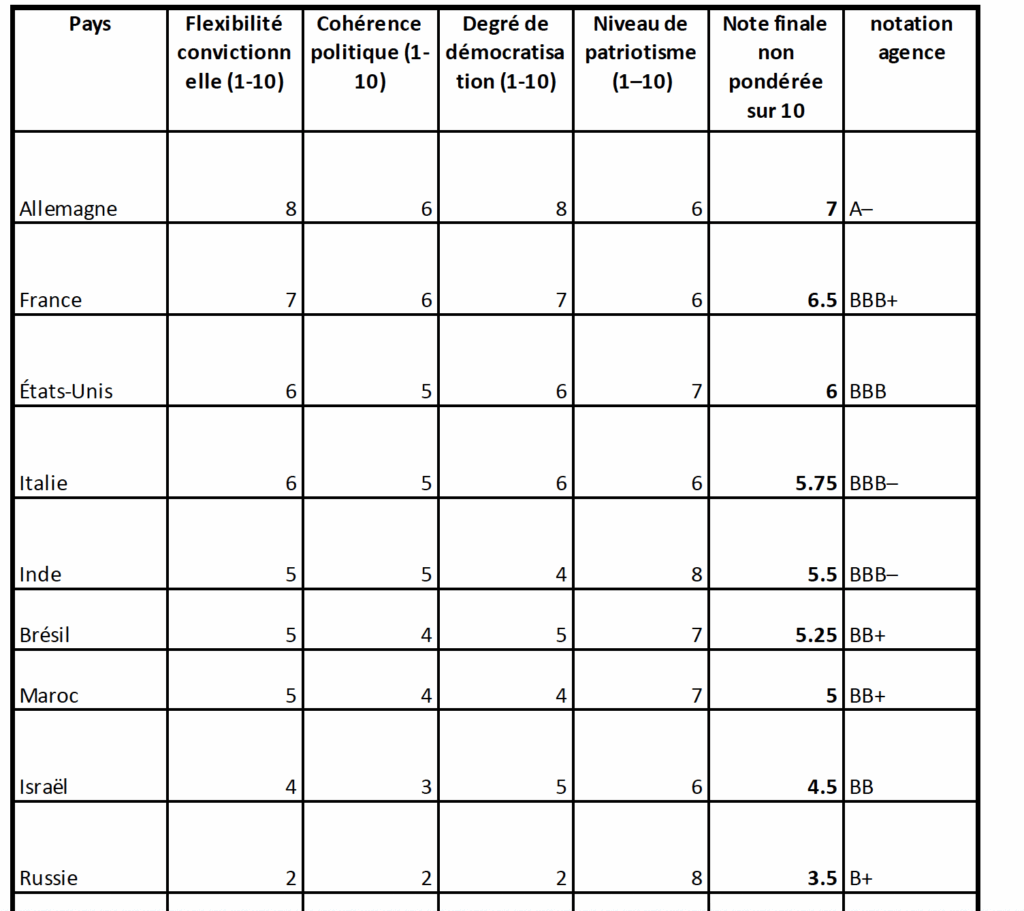What if we evaluated political regimes with the same rigor that financial rating agencies assess the solvency of states? This is the ambition of a new project initiated by the Council of Wise Men of Democracy, with a first experimental map, based on a synthetic political-civic rating, attributed to several nations on a trial basis.
Why such an agency?
Contemporary political life is often dominated by polarized debates, partial narratives, and misleading indicators. Too often, the only proposed framework pits "democracies" against "autocracies," without nuance. However, the state of a society cannot be reduced to the sole organization of its institutions. It is also a matter of relationship to conviction, coherence between rulers and ruled, actual level of democratic support, and now, the degree of patriotism experienced.
Three fundamental criteria for a political note
We selected three main components, each rated out of 10 and weighted according to its contribution to the final diagnosis:
- Convictional flexibility (weight 40%)
The opposite of ideological dogmatism; it measures openness to debate and the reversibility of ideas in a society. - Governed-governing coherence (weight 30%)Assesses the degree of alignment – or fracture – between the ruling elite and the population.
- Level of democratization (weight 30%)
Integrates the classic criteria: political pluralism, fundamental freedoms, transparency, separation of powers.
In addition to these three dimensions, there is now a free indicator of “patriotism”, measured independently of the final score, but whose sociological load deserves to be compared between nations.
The method: heuristic but transparent
At this stage, the ratings are the result of a rigorous heuristic approach, based on a synthetic reading of the following sources:
- national and international press articles,
- representative political speeches,
- university or intellectual platforms,
- sociological studies or existing indices (Freedom House, V-Dem, etc.).
AI was used to aggregate and analyze this material, with a constant concern for qualitative consistency.
First lessons from the map
The current map includes around fifteen countries. While not claiming to be exhaustive or completely objective, it reveals:
- paradoxes: very patriotic but not very democratic societies, or vice versa;
- tensions: strong governed-governors coherence in authoritarian regimes, but at the cost of high rigidity;
- leads: Israel, for example, combines high patriotism with strong tension between the political elite and civil society - which justifies the urgency of rethinking its institutional balances.
And now ?
This first version is a call for debate and co-construction. It does not claim to judge or classify once and for all. It offers another way of looking at politics, one that is more transversal, more human, and also more critical.
In the coming weeks:
- The Council will propose to extend the map,
- will engage in discussions with researchers, academic partners and government agencies
- and will explore the most readable formats to disseminate this notation (dynamic graphs, online observatory, etc.).

